Written with assistance from Verginia Turpin
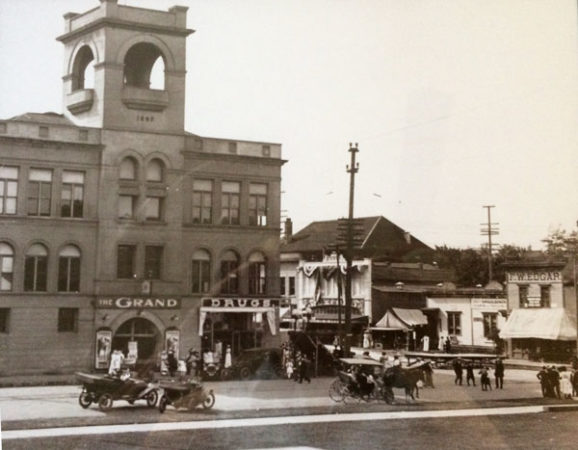
It began with a photograph picked up at a yard sale by my mom-in-law. It is a really beautiful image; a brick theater building, early autos, a celebratory mood. The label on the back reads “Grand Theater, Medford Or. 1913” Neither of us were familiar with a Grand Theater in Medford. We were determined to find out when it was in business and where it was located.
Our first attempt to figure out where the building may be, if not razed, was to investigate downtown Medford. We drove down Main, between the bridge and South Oakdale, up and down a few numbered streets. We tried to match windows, height, and frontage of the current historic downtown area and compared them to the photograph. A couple buildings certainly could have been contemporaries of those in the picture, but somehow they were missing elements; even taking consideration for remodels from years past, they just were not looking quite right.
Next, we began a web search. This led us to the wonderful work of Southern Oregon historian Ben Truwe. Scouring his site we found a page on the “Grand Theater.” Not much was known about it other than it was short lived. By then we knew that the Grand Theater in our photograph was not the Grand Theater of Medford, Oregon. It was a mislabel. Our photograph mystery was solved, it wasn’t a scene from early Medford, but we were hooked on the chase to find out more about Medford’s Grand Theater.
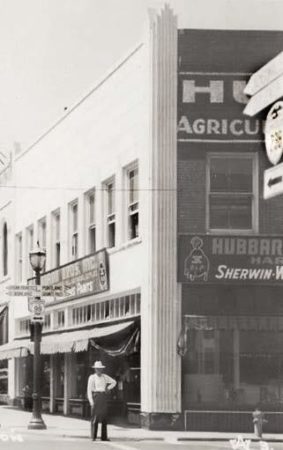
Turning to historic newspapers we began to search using Google’s Historic Newspapers and the Historic Oregon Newspapers site through the University of Oregon. We used different spellings: theater and theatre, plugging in names and generally reading through the days, weeks and months. Fortunately, during the years 1905-1910, Medford’s papers were on average four pages in length and followed a routine placement; national and local business news front page, society and amusement fourth page.
Using Truwe’s website as a basic outline we began looking for information about the building and business. We found a 1906 Medford Mail note that Wallace Woods purchased the Mitchell & Boeck blacksmith shop and ground with the intent to “erect a two-story brick building” once the lease of the occupants expired. According to Truwe this was the building within which the Grand would eventually be located.
The first advertisement we found for the Grand Theatre was June 9, 1908. The ad boasts a “Big Show Tonight” and continues on with “Last Evenings Trouble, Caused By Defective Electricity, Has Been Remedied” and offers to honor the previous evening’s coupons. Admission was 10 cents. Films playing at the Grand in the summer of 1908 included “Ben Hur Chariot Race,” “The Clown’s Love Story” and “What a Pipe Did.”
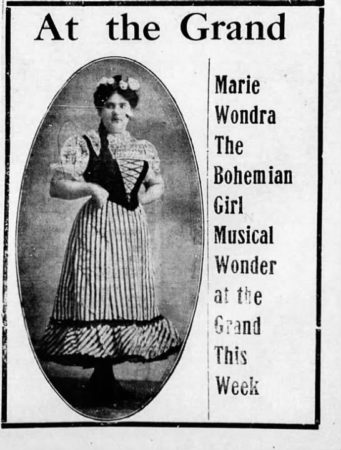 We learned of a change in ownership mid-July 1908. A.F. Edwards bought the Grand from Mr. Kennedy. Improvements were promised with the purchase of a new machine and assurances made that there would be no interruptions in daily performances. July 23, The Grand announces the “New Edison Perfection Moving Picture Machine” and we see the first Saturday matinee at a cost of 5 cents. The new management was working diligently to be the theater of choice in town. On July 26, only three days after the announcement of the new picture machine, we read “the efforts of the new management in producing the best pictures and songs available are being well directed.”
We learned of a change in ownership mid-July 1908. A.F. Edwards bought the Grand from Mr. Kennedy. Improvements were promised with the purchase of a new machine and assurances made that there would be no interruptions in daily performances. July 23, The Grand announces the “New Edison Perfection Moving Picture Machine” and we see the first Saturday matinee at a cost of 5 cents. The new management was working diligently to be the theater of choice in town. On July 26, only three days after the announcement of the new picture machine, we read “the efforts of the new management in producing the best pictures and songs available are being well directed.”
One showing is of particular note that Sunday. Redmen, “Indians” were invited to a special matinee from 1:30-2:30. More than likely the Redmen was the fraternal organization the Improved Order of the Red Men, whose Medford Hall was once located on Apple Street and the still standing Redmen’s Hall in Jacksonville. The heavy advertising continued through out the summer and fall. On August 3, the Grand’s ad claims it to be “the house of high class shows. When the Grand opened under new management we promised the public a strictly high class moral entertainment. Whether or not we have done so those of you who have seen our offerings in the past are the judges. From the many expressions of approval that we have heard on all sides, we believe that we have succeeded. It is not our intention, however to rest upon our laurels or crave your future patronage upon the strength of our success in the past. Our intention is to always equal, and, when we can, surpass our previous offerings”
Ads also ran as though they were informative articles. On October 23 the “Bryan Film is One Best Bet” appears to be an advertisement under the guise of a film review. A film showing of William Jennings Bryan saw “the house crowded and the audiences enthusiastic.” The William Howard Taft movie on the other hand was described as “a frost” with the “attendance so poor and the enthusiasm so great that one could hear a pin drop at any time.” A great example of early snark!
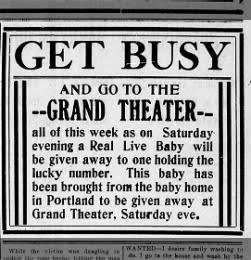 For all the previous advertisements complimenting the viewing public, announcing the purchase of the best equipment available, and calling the Grand a “house of high class” the most interesting of all advertisements was found December 30, 1908.
For all the previous advertisements complimenting the viewing public, announcing the purchase of the best equipment available, and calling the Grand a “house of high class” the most interesting of all advertisements was found December 30, 1908.
This ad reads “Get Busy” in bold letters. Enclosed in a decorative box the ad continues “and go to the Grand Theater all of this week as on Saturday evening a Real Live Baby will be given away to one holding the lucky number. This baby has been brought from the baby home in Portland to be given away at Grand Theater, Saturday eve.” To add to this shocking promotional giveaway was a poem located just a few inches over
“Saturday will be the day/That we’ll give a baby away./This will happen at the Grand./ If your bachelor friend should get it, wouldn’t it beat the band.”
Also on the page is this –
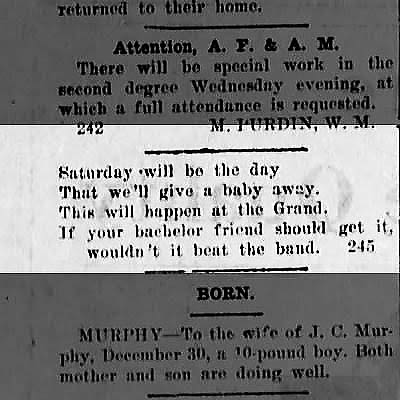 “Last Night at the Grand Theater The startling announcement was made that on Saturday night a real live motherless baby would be given to the one holding the coupon to correspond with the number the baby is labeled. This has known to have happened at other cities but steps have already been taken to see that no such uncivilized, barbarism shall take place in Medford. The Humane Society, as well as the various churches, have notified the manager, Mr. Edwards, that his program must be discontinued.
“Last Night at the Grand Theater The startling announcement was made that on Saturday night a real live motherless baby would be given to the one holding the coupon to correspond with the number the baby is labeled. This has known to have happened at other cities but steps have already been taken to see that no such uncivilized, barbarism shall take place in Medford. The Humane Society, as well as the various churches, have notified the manager, Mr. Edwards, that his program must be discontinued.
However, Mr. Edwards is fully determined to carry the matter through. Great excitement is expected to prevail and in all probability the police will be compelled to interfere Saturday night unless Mr. Edwards decides to discontinue his program or change his mind.”
For all the publicity before the giveaway the result was, in print at least, demure.
“At the Grand Saturday night, Marian Wilsey was awarded the baby. It was a very funny stunt. The house was packed to the doors. The Grand is booking new vaudeville acts for every week in connection with the best motion pictures and illustrated songs. And when you go to the Grand you always get your money’s worth. See West and Welch wrestling exhibition tonight.” This was the only reference to the publicity stunt and was printed on January 4, 1909.
Business advertisements continued to appear in the newspaper at a brisk rate. In late January, the Grand announced that the house was going to be enlarged and suitable for families. However, on February 12 under the heading Remodel Building it is announced that “Dr. F.C. Page, owner of the Grand theater building, is having it remodeled and made up-to-date. When finished it will be occupied by the Fouts grocery…” By March 5, Fouts Grocery had “moved from the Dr Page building, on east Main street to the Wallace Woods room, nearly opposite on the same street.” April 30,1909 we learn that C.H. Symcox, had put “his faith in Medford by purchasing the Wallace Woods building on East Main street, at a cost of $10000. The structure, which was formerly known as the Grand Theater building was sold by White & Trowbridge”
It was the end of the Grand in 1909 and the end of the research for us. One wonderful and unanticipated outcome in this adventure is knowing that the Grand Theater’s building still stands and is protected as a national historic register landmark in downtown. The Wallace Woods building is located just west of Hubbard Brothers Hardware building on East Main and North Riverside.
Heather Kliever is originally from Medford and currently the Education Curator for the Lane County Historical Society in Eugene. Verginia Turpin is an antiques dealer and lifelong resident of Medford.

